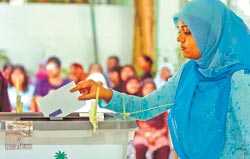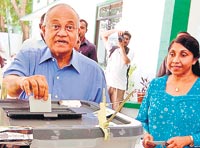
Maldives votes on political future: Acid test for Gayoom
MALE, Saturday (AFP) -Voters in the Maldives cast their ballots today in a referendum to decide the future political direction of the tiny Indian Ocean atoll nation, one of Asia's most exotic tourist destinations. The vote is seen as an acid test for Asia's longest serving ruler, President Maumoon Abdul Gayoom, who took power in 1978, and follows years of simmering political unrest and calls for change in the former British protectorate. The 194,000 eligible voters in the mainly Sunni Muslim nation were to choose between a British-model parliamentary democracy and a US-style presidency with strong executive authority. Most polling stations in the tiny republic— a popular spot for sun, sea and surfing — closed at 7:00 pm (1400 GMT), but election officials said some would remain open to accommodate voters in line before the cut-off time. On the capital island of Male, voters were still queueing up outside the national stadium, and officials said they would only close the boxes once everyone had cast their ballots.
Voter turnout was put at between 60 to 70 percent, election officials said, amid allegations of irregularities. Gayoom and his wife Nasreena, dressed in the official blue of his ruling Dhivehi Rayyithunge Party (DRP), lined up with other voters early in the day at the Iskandhar School in Male. “It is the right of every citizen to vote today, so I thought as a citizen I should vote,” Gayoom told reporters. The DRP is backing a presidential system under a new constitution where the president could serve two five-year terms. Gayoom is already in his sixth term under the present charter and has said he would run again under the new system. Protestors led by the main opposition Maldivian Democratic Party (MDP) have taken to the streets in recent years to demand greater civil rights and protest Gayoom's rule, described by opponents as autocratic. MDP head Mohamed Nasheed has said the only way to inject democracy and good governance into the country is to have a prime minister answerable to parliament. Young MDP supporters like Sabra Noordeen, 20, voted for the parliamentary model.“I want my leaders to be held more accountable and ensure that every member of the cabinet is elected by the people,” Noordeen said. |
|| Front
Page | News | Editorial | Columns | Sports | Plus | Financial
Times | International | Mirror | TV
Times | Funday
Times || |
| |
Copyright
2007 Wijeya
Newspapers Ltd.Colombo. Sri Lanka. |

